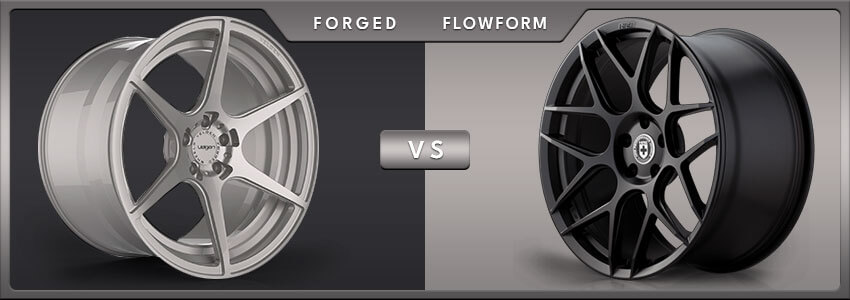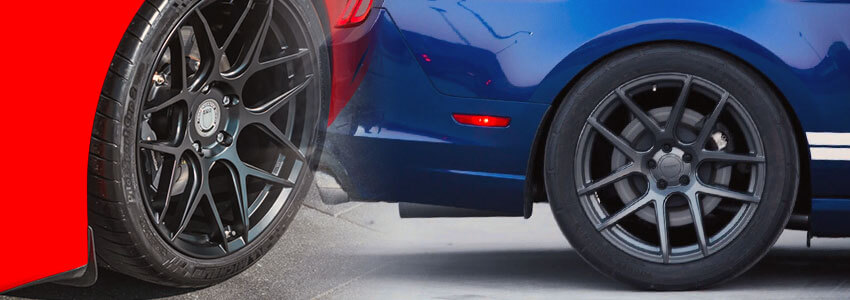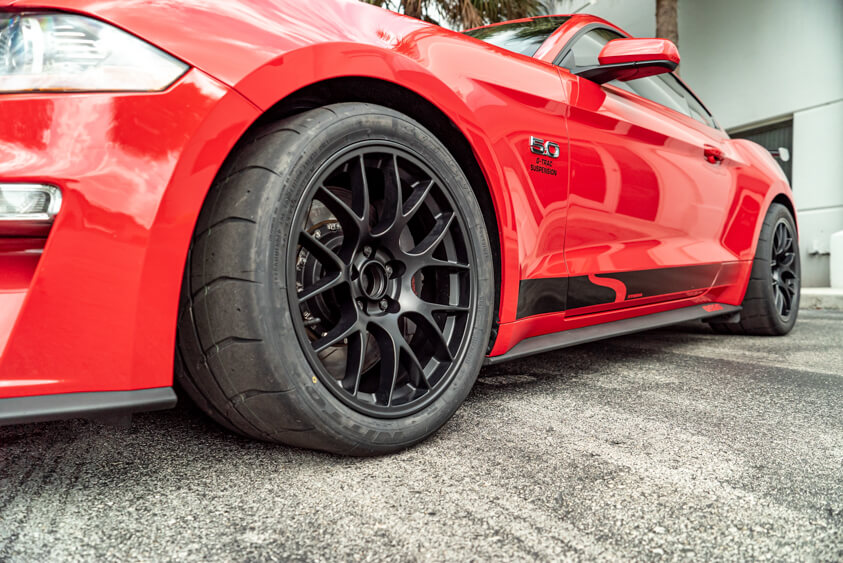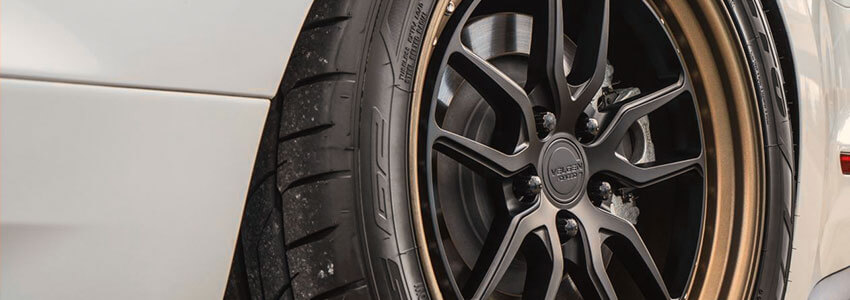In the world of Mustang performance, horsepower and styling are at the center of every enthusiast's mind.
Every Mustang owner strives to attain the best form and function for their stallion.
Unfortunately, it can be challenging to separate yourself from the rest of the herd because many
owners enjoy the same wheel styles. As wheel technology has progressed within the last ten years,
so has the plethora of options and styles you can choose. For many years, Mustang fans
only had a limited number of wheel styling and structure options. First and foremost, the most popular wheel on the market today is a cast wheel; you're probably wondering
why is that? First off, they are very inexpensive to mass-produce for vast quantities. Secondly, cast
wheels are a process in which wheels are manufactured from a molded form to a shape or a cast until the
liquid aluminum is cooled down, trimmed, and drilled out to the manufacturer's design. There is a
significant downside to a cast wheel, which is porosity. Porosity is the physical space inside the cast
wheel's material once it has had a chance to be cooled. It allows for weak points to form when the
casting occurs. To counteract this issue, wheel manufacturers will use larger tolerances to ensure
rigidity but, at the same time, are prone to holding more weight. The upside to this is that cast wheels
are much more cost-effective to every Mustang enthusiast, while on the flip side, you will have to deal
with a cumbersome wheel that doesn't aid in rotational mass at all; it only will increase it. Thankfully, this is not the only form of wheels that are on the market today. As cast wheels have become
very outdated and primarily used for more cost-effective options, hardcore Mustang owners look to
both forged and flow form wheel options to get the most strength and attain the lightest weight
possible. Throughout this article, we will give you a complete breakdown of the differences between flow
form and forged wheels! Chances are, if you love wheels as much as we do here at Steeda, then you will love the multiple
characteristics and benefits a flow form wheel has to offer your Mustang. When searching for a set of
wheels, you will ask yourself a few variables: how much I am willing to spend, what style I am searching
for, and how will I free up rotational mass? Fortunately, there is a solution for those Mustang
enthusiasts who want to have a cost-effective price point and have an exceedingly strong wheel; the
answer is a flow form wheel. Now, if you're relatively new to the world of wheels, you may not know what
a flow form wheel is and how it is constructed. Whereas a cast wheel is formed from a mold with liquid aluminum and then milled out to create its shape,
a flow form wheel is engineered with the base of a cast wheel, which is then purposely made narrower
than its original design. After this process is complete, manufacturers like HRE Performance Wheels will
stick the wheel barrel on a machine that will spin it. In contrast, it will let the steel roll against
the wheel while compressing and stretching the wheel barrel, resulting in a forged-like wheel with
similar structural characteristics in rigidity and strength but benefiting from a lightweight structure,
reducing rotational mass. Most enthusiasts are always looking for the best quality wheel without
breaking the bank; fortunately, flow-formed wheels are not at the price point where the forged wheel is
at, making it very cost-effective for any Mustang enthusiast to attain. Most Apex wheels are flow-formed and
people run them regularly as a dedicated track wheel, as they are well-known to have an incredibly
strong manufacturing process that challenges most forged wheels at an incredible price point! They are
great for daily driving, track work, and
spirited driving through any canyon or back road. We run 18" x 11" Apex EC-7s on our HPDE car regularly at the
track and they stand up very well to Glen's aggressive driving style! They will no doubt complement your
Mustang in terms of
performance, styling, structural integrity, and stance to help you stand out from the herd of stallions
in the community. The first variable you need to understand about forged wheels is that they do not come cheap and are not
for the faint of heart. Forged wheels are commonly acquired or used for Mustang enthusiasts or racers
that need the strongest, lightest, and most rigid to handle different track or road conditions. Unlike a
flow-formed wheel, a forged wheel is built with varying principles that the manufacturer implements on
how they're constructed. Where a flow form wheel has one way of being made, a forged wheel has
multiple ways to build, such as machine forging and mold-form forging. You will want to note that forged
wheels come at a hefty price tag and be prepared to pay well near $1,000 or more per wheel. When you are looking to get a forged wheel, you will find that the build process is often machined
forging; most forged wheel manufacturers like Velgen
Wheels will use this process. It starts with a
single piece of billet aluminum subjected to extreme temperatures combined with a massive amount of
pressure, compressed to the wheel's structure to make a much stronger piece than the original piece unit
of billet. After this is completed, it will be taken to be milled into its intended design; this is
the authentic way forged wheels have been constructed for many years. Many companies use different methods to build forged wheels throughout the wheel marketplace, such as
mold-form forging. It is different because the shape of the wheel is created during the forging process.
When you are making
the shape of the wheel during the forging process, you allow the grain of the metal to flow with the
wheel's intended design body, resulting in a tremendous amount of strength and rigidity. Once this
process is completed, builders will take the forged wheel to a press machine that will apply ten
thousand tons of pressure to the wheel's outer and inner portion to finish creating the desired wheel
design. Choosing the right set of wheels is very subjective to the individual Mustang enthusiast. Everyone is
going to be after a unique style and price point. If you look at both a flow form wheel and a forged
wheel, they are similar to how they both have extreme rigidity and construction, but they differ in the
price tag and the application you intend to use. Flow form wheels are for the enthusiast looking to
receive high strength, cost-effectiveness, and weight-savings without breaking the bank. A forged wheel is designed to take the most abuse and adjust to various conditions depending on what
application it is used. The significant benefits you will get out of a forged wheel versus a flow form
wheels will be the weight-saving; for Mustang racers and hardcore enthusiasts getting the most weight
reduction to decrease rotational mass is vital. When you reduce rotational mass, you increase the
horsepower your Mustang will produce to the ground. The rule of thumb is when you have more weight on
all four corners; it takes more horsepower and torque to spin that weight, reducing it frees up
power-on-demand. Whether you can afford a forged wheel or need to be budget-friendly with a flow form
wheel, you will be increasing your Mustang styling, agility, and reducing your rotational weight no
matter what you decide. Ultimate Mustang Brake Pad Guide Top 5 Mustang Drag Racing Mods Beginners Guide To Modifying Your S550 Mustang Image Credit: Velgen Wheels, HREMustang Forged vs Flowform Wheels


Mustang Flow Form Wheels
 18"
Apex EC-7s on our HPDE S550
18"
Apex EC-7s on our HPDE S550

Mustang Forged Wheels
Machine Forging
Mold-Form Forging

Which Mustang Wheels Are Right For Me?
Related Articles





